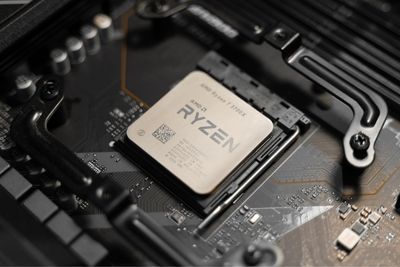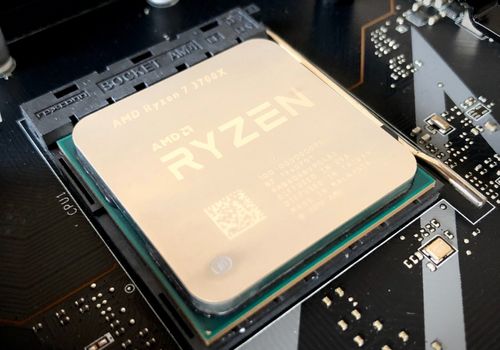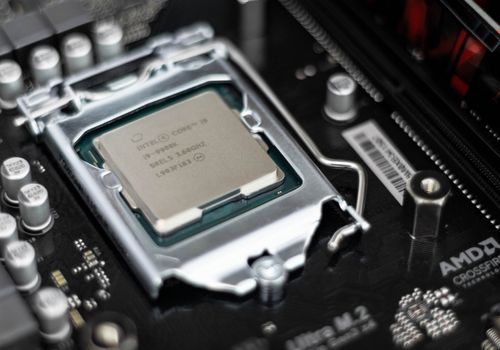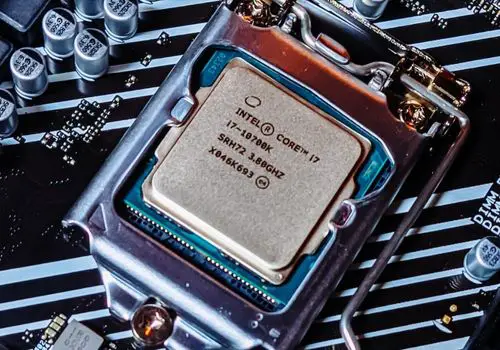
The AMD equivalent of the Intel Core i7 family of processors is the Ryzen 7 series. Both these processors offer impressive clock speeds and support for overclocking. They are perfect for users looking for enhanced performance for high-end games and professional work.
I love being on the cutting edge of tech. Because of this, I've always tried out the different families and new generations of Intel Core and AMD Ryzen processors as they launch. Over the years, I've been able to draw parallels and figure out what the AMD equivalent of each Intel Core series is.
If you're looking to find out the AMD equivalent of the Intel Core i7, you're in the right place. This guide will provide you with the basic info you need to get started. Let's get right into it.
Contents
The AMD Ryzen 7 processors are most comparable to the Core i7 options from Intel. The AMD Ryzen 7 lineup consists of high-performance processors which are perfect for people who want great gaming performance or smooth work with tasks like video editing.
Also, when looking at a 13th-generation Core i7 processor, it is best to compare it to a 7000 Series AMD Ryzen 7 processor. If you use the previous AMD Ryzen generation, there's bound to be a difference in performance.
The Core i7 series is not the most powerful option that Intel has, and the same applies to the AMD Ryzen 7 lineup. That prize goes to the AMD Ryzen 9 series. However, even if you can't pay the higher price for a Ryzen 9 chip, the Ryzen 7 is still very formidable.
To show you how powerful the Ryzen 7 line is, let's talk about some of the features common to its processors.

All AMD Ryzen 7 processors in the 7000 series, whether they are built for mobile (laptops) or desktop, have 8 cores.
Each core is essentially a full-performance core, so there's no equivalent of an E-core here. It is a core built to prioritize power efficiency over power.
Regarding clock speed, there's a clear difference in base clock frequencies when you compare the Core i7 lineup to AMD Ryzen 7 models.
Between the desktop AMD Ryzen 7 CPUs, the base clock range is 3.8 GHz to 4.2 GHz. This is much higher than you get with Intel's offerings.
The story is different when you look at Ryzen CPUs for laptops. The clock speed range starts at 2.0 GHz and can go up to 3.8 GHz. This range makes for a better comparison to Intel's mobile entries.
The reason for such a wide range of speeds with the mobile processors is that, unlike the desktop models where the 7000 Series are all built on the same architecture, the mobile models are split between 3. A processor built on an older architecture will naturally be slower.
Also, keep in mind that all desktop AMD Ryzen 7 processors can be overclocked, but with an i7, only those with the "K" suffix can.
You won't need a separate GPU if you have any of AMD's Ryzen 7 7000 series chips.
Each desktop processor in the Ryzen 7 lineup has a GPU simply called AMD Radeon Graphics.
The mobile processors are similarly equipped, though you might get an AMD Radeon 610M, 680M, or 780M, depending on your model.
These aren't the best for intense video editing, but they offer decent performance.
For a long time, the Intel Core i7 lineup of processors was the choice for power users who wanted to choose or build a computer with the best overall performance.
While it has been superseded by the Intel Core i9 processors (introduced in 2017), the Intel Core i7 CPUs are still considered high-end. They are perfect if you need a chip that can do a lot of heavy lifting but you want to stick to a budget.

The 13th generation of Intel Core i7 processors was released in 2022. When counting the CPU cores, know that there are two sets: P-cores (for performance) and E-cores (for energy efficiency).
All desktop Intel Core i7 CPUs in this generation have 8 P-cores and 8 E-cores.
When it comes to the mobile Core i7 options, there's a lot more variation. However, 6 P-cores and 8 E-cores is the most common configuration seen. Some, like the Intel Core i7-13850HX, have 8 P-cores and 12 E-cores though!
Hyperthreading technology is an Intel innovation that basically gives a single core the ability to run more than one "thread" at the same time.
You can think of it like being able to perform two calculations simultaneously, instead of having to wait for one to finish before you can attend to the next one.
Hyperthreading only applies to P-cores though and in all cases, allows two threads to run on a single core. This means an Intel Core i7 processor with 8 performance cores will have 16 threads in total.
Clock speeds might be the first thing that most power users look at when trying to choose a CPU.
The good thing is that when it comes to clock speed, the Intel Core i7 series is very capable. Looking at the P-cores in the regular desktop models, the base clock speed starts at 2.1 GHz and goes up to 3.4 GHz for the more powerful CPUs in the family.
For the mobile (laptop) Intel Core i7 CPUs, the range starts at 1.9 GHz and goes up to 2.6 GHz.
The low-power Core i7 models, which can be identified by the "U" in their model names, tend to have lower clock frequencies, starting as low as 1.4 GHz for desktop options. Oddly enough, the baseline for the power-efficient mobile models is 1.7 GHz.
Turbo Boost technology has been around on the Intel Core i7 lineup since the very first generation. This technology allows the processor to push to a higher clock speed only when needed, which keeps heat and energy drain to a minimum.
With the 13th generation of Intel Core i7 processors, you get access to Turbo Boost Max Technology 3.0, which you can't get with the lower Intel Core families, like the i5.
Turbo Boost 3.0 is different from Turbo Boost 2.0 because instead of a higher clock speed in the entire CPU, clock speed is increased on individual cores. The technology then pushes calculations to those specific cores, giving you the same great performance improvements, but without wasted energy.
Turbo Boost in Intel Core i7 processors can give you clock speeds as high as 5.4 GHz when needed.
If you're looking for a desktop Intel processor that supports overclocking, you want to keep an eye out for the K designation, such as in the 13700K. These have been left unlocked by Intel for overclocking.

Most processors in the Intel Core i7 family come with an integrated GPU, which means you can plug them into your motherboard and get to work right away, without needing a discrete graphics card.
The only ones which do not come with integrated graphics are the Core i7 models with an F in their model names.
With the desktop models, you'll get the Intel UHD 770 GPU, and with the mobile variants, you'll get either Intel UHD Graphics or Iris Xe.
Let's go through the most basic benchmarks of the highest-performance Intel Core i7 and AMD Ryzen 7 CPUs.
So, we'll be looking at the Intel Core i7-13700K and putting it against the AMD Ryzen 7 7800X3D.
Let's take a look at how these two processors performs when it comes to the benchmarks of a single core. Let's use Cinebench R23 for this.
The i7-13700K is no slouch, pushing out a score of 2092. The Ryzen 7 7800X3D wins in this category though, at 2145. This is only a 3% difference between both these CPUs, so you're unlikely to notice it.
Multi-core performance is a different story , even when using Cinebench R23 for benchmarks.
The 13700K, with a multi-core score of 30627, towers over the Ryzen 7 7800X3D, which only puts out 23035. That's a difference of 33%!
If you're looking for the AMD equivalent of an Intel Core i7 processor, the closest match is the Ryzen 7. Each Ryzen 7 processor has many cores to pull power from and offers a similar level of performance as Intel's CPUs.
Looking at benchmarks, single-core results are similar. However, the multi-core performance is where the Intel processor is able to come out on top by quite a margin.
